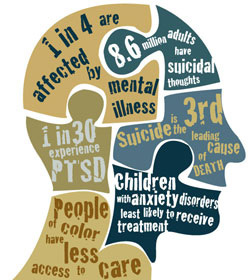It’s no surprise to many of us that mental health issues such as depression, O.C.D., and bipolar disorders plague our school. According to the most recent Healthy Kids Survey from 2016, 30 percent of juniors at Tam had experienced chronic sad and hopeless feelings and 13 percent had considered attempting suicide. While students are aware that their peers are struggling, many are unaware of the stigma surrounding mental health at our school, and the impact casually referencing these conditions can have on those around us.
Even with such high numbers of students suffering from depression and anxiety, we as a community fail to be open about these problems. The inclination to pretend that these issues don’t exist is all too common, and students tend to go to great lengths to avoid admitting that they are afflicted by any serious diagnosable condition. One possible cause of this type of denial may be called “Marin guilt.” Living in an affluent area, receiving a high quality education, and eating food every night, students may not perceive that they have the right to feel completely isolated and miserable.
But the reality is that “Upper-class children can manifest elevated disturbance in several areas—such as substance use, anxiety, and depression,” according to the National Institute of Health.
Despite our lack of communication about mental illness there are times when it is mentioned in our hallways and classrooms, yet the form that these references take does much more harm than good. All too often, we overhear statements such as, “My mom is so bipolar,” “I color coded my planner, look how O.C.D. I am,” and “I failed that test, I’m so depressed.” There are a few problems with this. First of all, you don’t know if the kid sitting across from you in math class is actually clinically depressed when you use the name of his condition colloquially to make a point. According to the National Institute of Health, “Many people with serious mental illness…are challenged by the stereotypes and prejudice that result from misconceptions about mental illness.”
Furthermore this nonchalant language further distances the names of these diseases from their somber reality. When we forget the actual medical symptoms and side effects associated with a word, we start to generalize. All of sudden people who have never been diagnosed by a psychiatrist are saying that they googled the symptoms and they have O.C.D. or that they’ve been feeling unhappy for a few weeks and that they are depressed. While it’s possible they are diagnosing themselves correctly, it is important that if one is concerned they are suffering from a mental condition that they receive a medical diagnosis and seek help from a medical professional.
Not only should students stop falsely diagnosing mental health conditions and nonchalantly referencing them, but they should also open up a healthy dialogue to discuss them seriously. This means educating yourself and your community on the symptoms and side effects of these diseases so you can sympathize with those around you. Furthermore, take the time to research or ask a friend, teacher, counselor, or parent about how to help someone who comes to you with a health problem, so you are prepared. Lastly, trying to be less judgmental of our classmates and ourselves and taking every opportunity to embrace our mistakes and imperfections would have a huge affect. We know how to solve complex algebraic equations and write an analytical essay, but in the accepting failure deparment we need a lot of work.
The combination of nonchalantly mentioning serious medical conditions, and ignoring those same conditions when they manifest themselves in a real person, has created a special Tam High brand of mental health stigma. Often insulting or further upsetting those with a mental health condition, these actions also spread misinformation and do a disservice to students at Tam who are trying to understand their peers and themselves.



Mac Tonight ♦ Jan 13, 2017 at 12:05 pm
As someone suffering from diagnosed bipolar mania, I can agree that self-diagnosis is a big problem, as one wise man once said “you can tell your friends that you have depression, anxiety, or I-want-attention Syndrome, I’m not buying it, you go to the doctor, you get a note, and then you tell me you have a problem”, I totally agree with that, because people putting “#depression” or “#bipolar” on their instagram selfies is a problem because nobody can take people who are confirmed to be suffering from these conditions seriously.
But the thing is, I’m not sensitive, I can take jokes about mental health, in fact, dark humor on my situation is a coping mechanism for me. I have a thick skin, so I’m not affected by the “impact of casual reference” mentioned here. I know that it’s not like that for everyone, not everyone has my personality.
name hidden because my mental health is none of your business.